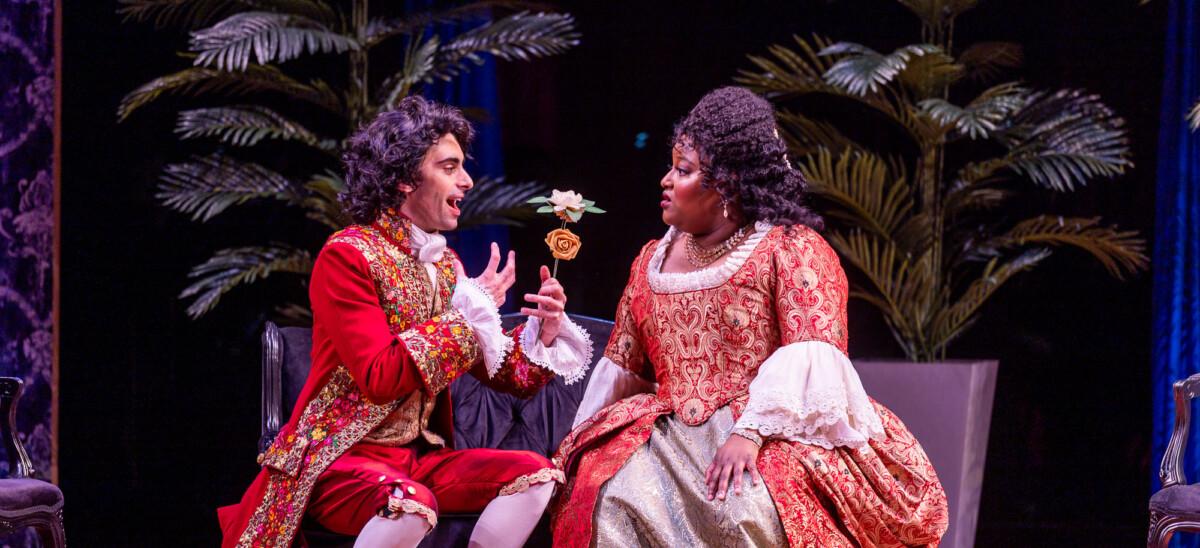An email from the music department turned an ordinary Thursday morning into an exciting game of “How fast can I fill out this google form?” The email’s subject line, “Free Boston Lyric Opera tickets up for grabs!” had caught my attention, announcing free tickets to the Boston Lyric Opera (BLO)’s opening night performance of the opera “The Anonymous Lover,” which had a limited weekend run in honor of Valentine’s Day. The tickets had been generously donated by a Wellesley alum and would be given to ten lucky Music Department students. One thing led to another, and the next day at 7:30 p.m., I found myself in Boston lined up outside the Huntington Theater’s brick and column facade for the show’s premiere.
“The Anonymous Lover” was written in 1780 by Joseph Bologne, Chevalier de Saint-Georges. It follows Valcour, a young Frenchman, who is in love with his close friend, the wealthy widow Léontine, but has been too afraid to tell her because she has closed off her heart to love after an unpleasant first marriage. Instead, he has spent the past four years wooing her anonymously through letters and flowers. He decides that enough is enough, and finally hopes to reveal himself to Léontine with the help of his best friend Ophémon and Léontine’s friend Dorothée.
Bologne was a talented and renowned composer of the Classical era (roughly spanning from 1750 to 1820), yet his identity as a biracial Black man meant that he has been reduced to being known as a “Black Mozart.” Bologne’s erasure from the canon of respected Western composers is representative of the structural exclusion of Black people and other people of color in the classical music world. This exclusion continues to this day as Western classical repertoire still enshrines only male European composers as masters of the art, remaining inaccessible to Black and Brown communities in particular. Amongst the different forms of Western classical music, opera has had a reputation for being particularly stuffy and insular, remaining very much a sphere dominated by white and wealthy individuals.
Considering this history, I especially appreciated the Boston Lyric Opera’s decision to have a Black female lead by casting the radiant Brianna J. Robinson as Léontine. Robinson’s clear soprano voice rang out beautifully throughout the theater, and the sensitivity and yearning with which she conveyed Léontine’s deep internal conflict when she realizes she might love her friend pulled at my heartstrings. Robinson’s vocal talent made her performance shine above the rest, although Sandra Piques Eddy’s acting as Dorothée was wickedly fun to watch as well. The supporting cast of “The Anonymous Lover” were absolutely crucial for the show’s success, injecting so much energy, dynamism and humor into an otherwise relatively simple plot. Eddy’s Dorothée and Evan Hughes’s Ophémon were especially charismatic in their joint scheming, playing off of each other effortlessly and acting as necessary foils to Robinson’s straight-laced, guarded Léontine and Omar Najmi’s awkward yet lovable Valcour. I felt Najmi’s performance, although still very strong, was perhaps the weakest compared to the others in the cast — his vocal performance paled in comparison to Robinson’s sheer talent, and the chemistry between Valcour and Léontine fell flat at times.
The layout of the Huntington Theater made for a cozy and informal viewing experience, which helped me connect with the performances. It worked to the advantage of the production as a whole, which sought to make the opera more relaxed and accessible for audiences by changing the libretto, or the dialogue, from French into English. The orchestra, half-veiled by a sheer screen and located upstage behind the actors rather than in the pit, was delightful to experience, playing Bologne’s light embellished melodies with so much charm and personality. The BLO’s production of “The Anonymous Lover” as a whole was simply delightfully charming and lighthearted, making for a sweet, lovely production for Valentine’s Day.





